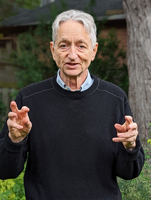|
INTERVIEWS
Podcast/Video Interviews by Stephen Ibaraki
A Chat with Geoffrey E. Hinton: The Nobel Prize in Physics 2024; the "Godfather of AI"; Pioneer in the field of deep learning; Association for Computing Machinery's A.M. Turing Award recipient (alongside Yoshua Bengio and Yann LeCun)
This week, Stephen Ibaraki has an exclusive interview with Geoffrey E. Hinton.
 Geoffrey Hinton, 2024 Nobel Laureate in Physics and the "Godfather of AI," is internationally renowned as a pioneer in the field of deep learning as a mode of artificial intelligence. With John J. Hopfield, he received the Nobel Prize in Physics "for foundational discoveries and inventions that enable machine learning with artificial neural networks," including his invention of the Boltzmann machine using statistical physics techniques. In 2018, he received the Association for Computing Machinery's A.M. Turing Award, often called the "Nobel Prize in Computing," alongside Yoshua Bengio and Yann LeCun "for conceptual and engineering breakthroughs that have made deep neural networks a critical component of computing." Geoffrey Hinton, 2024 Nobel Laureate in Physics and the "Godfather of AI," is internationally renowned as a pioneer in the field of deep learning as a mode of artificial intelligence. With John J. Hopfield, he received the Nobel Prize in Physics "for foundational discoveries and inventions that enable machine learning with artificial neural networks," including his invention of the Boltzmann machine using statistical physics techniques. In 2018, he received the Association for Computing Machinery's A.M. Turing Award, often called the "Nobel Prize in Computing," alongside Yoshua Bengio and Yann LeCun "for conceptual and engineering breakthroughs that have made deep neural networks a critical component of computing."
Hinton received his BA in Experimental Psychology from the University of Cambridge in 1970 and his PhD in Artificial Intelligence from the University of Edinburgh in 1978. After completing postdoctoral work at Sussex University and the University of California San Diego, he spent five years as a faculty member in the Computer Science department at Carnegie Mellon University. He then became a fellow of the Canadian Institute for Advanced Research and moved to the Department of Computer Science at the University of Toronto in 1987. He spent three years from 1998 until 2001 setting up the Gatsby Computational Neuroscience Unit at University College London and then returned to the University of Toronto, where he was named a University Professor in 2006 and is now University Professor Emeritus. Since 2017, Hinton has been Chief Scientific Advisor at the Vector Institute in Toronto.
Hinton was one of the researchers who introduced the backpropagation algorithm and the first to use backpropagation for learning word embeddings. His other contributions to neural network research include Boltzmann machines, distributed representations, time-delay neural nets, mixtures of experts, variational learning and deep learning. His research group in Toronto made major breakthroughs in deep learning that revolutionized speech recognition and object classification.
He is a fellow of the UK's Royal Society and the Royal Society of Canada and an international member of the US National Academy of Sciences, the US National Academy of Engineering, and the American Academy of Arts and Sciences. In addition to the Nobel Prize in Physics and the A.M. Turing Award, numerous international awards have recognized the impact of his research, including the 2022 Princess of Asturias Award in Technical and Scientific Research (Spain; with Yann LeCun, Yoshua Bengio, and Demis Hassabis); a 2022 Royal Society Royal Medal (UK); the 2021 Dickson Prize in Science (US); the 2019 Honda Prize (Japan); the 2017 BBVA Foundation Frontiers of Knowledge Award in Information and Communications Technology (Spain); the 2016 NEC C&C Award (Japan); and the 2016 Institute of Electrical and Electronics Engineers (IEEE)/Royal Society of Edinburgh James Clerk Maxwell Gold Medal (US/Scotland). In Canada, Hinton has received the top national prizes in science and engineering - the Killam Prize in Engineering (2012) and the NSERC Gerhard Herzberg Canada Gold Medal for Science and Engineering (2010) - and has been named a Companion of the Order of Canada (2019), recognizing a lifetime of outstanding achievement and merit of the highest degree, especially in service to Canada or to humanity at large.
Photo credit: Credit UoT News: https://www.utoronto.ca/news/geoffrey-hinton-wins-nobel-prize#:~:text=Geoffrey%20Hinton%2C%20a%20University%20Professor,the%20prize%20with%20John%20J
Bio Credit: University of Toronto
Photo Credit: University of Toronto
TO WATCH THE VIDEO INTERVIEW, CLICK ON THIS MP4 file link
|